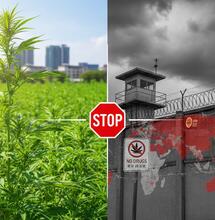Weed Rules Deter Young People from Government Jobs

The government has struggled to attract young workers for some years now. Meanwhile, a lot of young people do not complete applications for federal job applications, and sometimes they withdraw applications because of strict marijuana rules required for obtaining a security clearance. A recent survey gives the figures, and they are painstaking.
Questions have been raised about whether federal marijuana prohibition prevents young people from applying for government jobs. A recent survey has found that one in four young people do not apply for these jobs because of marijuana-related requirements.
According to the survey, 30 percent of those aged between 18 and 30 have either declined to apply or withdrawn applications for jobs. Notably, 20 percent of participants said that they've declined to apply for government jobs because of the restrictive federal policies on marijuana. Another 10 percent said they've withdrawn job applications because of the cannabis rules.
Conducted by ClearanceJobs and the Intelligence and National Security Foundation (INSF), the poll was published last month on the unofficial weed holiday April 20. The survey interviewed 905 young adults, aged 18 to 30, living in Colorado, California, Maryland, the District of Columbia, Florida, Texas, and Virginia.
The interviews were carried out in February of this year and included questions about federal employment policies, and had a special focus on marijuana.
Participants were initially asked if they had ever considered working in a federal position that requires a security clearance. Almost 80 percent said they would or might consider applying. However, 40 percent also answered that they've used cannabis in the past year.
The poll found that 25 percent believe that the government's cannabis policy would prevent them from seeking federal jobs that require security clearance in the future. Thirty-nine percent answered that they would be willing to abstain from weed use in order to secure a government job, while 18 percent said they wouldn't. In addition, 15 percent said they would not discontinue cannabis after obtaining a security clearance.
Still, there seems to be some kind of confusion about the security clearance requirement. A significant part of the survey participants do not seem to have a full understanding about it and the accompanying drug-free criterion.
While 16 percent said that any cannabis use automatically makes them ineligible for security clearance, 37 percent said marijuana does not have an eligibility impact. Twenty-four percent said it is one of several factors necessary for clearance, and 23 percent said they were unaware of this requirement.
After obtaining security clearance, nine percent said those individuals could use cannabis anywhere, 31 percent said they could use weed in legal states, 33 percent said cannabis use is prohibited, and 26 percent answered that they didn't know.
Just four percent of participants correctly answered questions about what the federal government's security clearance rules are for applicants and for those who obtain one.
In most cases, individuals who have used drugs in the past may still obtain a security clearance. However, they are obliged to remain drug-free in the future.
Cannabis employment policies maintain a level of strictness as federal prohibition continues, although various agencies have moved to loosen requirements lately.
One example is the U.S. Secret Service (USSS) which recently updated its employment policy to be more open to applicants who've previously used cannabis. The USSS now allows candidates of any age to become eligible a year after they've last used marijuana.
Another is the Federal Bureau of Alcohol, Tobacco, Firearms and Explosives (ATF). Their update goes on to say that applicants who've cultivated, manufactured, or sold cannabis in compliance with state laws while serving in a "position of public responsibility" will no longer be automatically disqualified.













